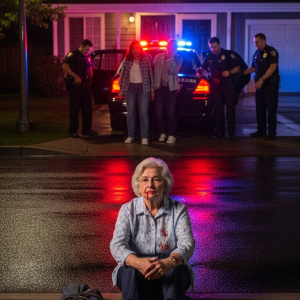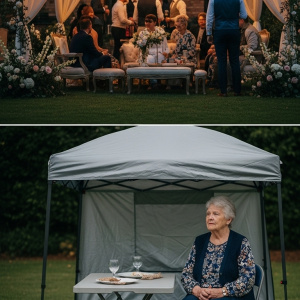My wife, Christine, and I have been married for ten years. We have a beautiful nine-year-old daughter and a life that, from the outside, looks perfect. We’ve had our ups and downs, but we always came through them. Infidelity was never on my radar; our physical life was healthy, and I trusted her. I trusted her completely.
Two weeks ago, that trust was shattered. I was on my way to the business I built from the ground up—the same business where she works alongside me. A car ran a red light and T-boned me. I woke up in a hospital bed with a broken femur and a broken humerus. The pain was immense, but the feeling of helplessness was worse.
After two days, once the doctors confirmed there was no internal damage, I was sent home. My world had shrunk to the four walls of our house. I was wrapped in casts, stumbling and leaning on furniture just to get around. For the first week, Christine was an angel. She helped me with everything, always smiling and assuring me I wasn’t a burden.
But something shifted in the second week. The smiles became strained, her answers shorter. Our intimacy had, of course, been put on hold. I assumed her frustration stemmed from that. When I asked her, she flatly denied it and left the room. I felt a knot of dread tighten in my stomach. She was hiding something.
Then came the day that changed everything. She returned home from managing the business, and her mood was radiant. She was bubbly, almost glowing, in a way I hadn’t seen since my accident. The sudden shift was jarring. My mind, clouded with suspicion, went to a dark place. Where did this sudden happiness come from?
I couldn’t shake the feeling that her good mood wasn’t from a successful day at work. It felt… personal. Over the next week, a disturbing pattern emerged. Most days, she was irritable and distant. But every few days, she would come home with that same bubbly energy, humming to herself, avoiding my kiss at the door.
My paranoia grew into a sickening certainty. I had to know the truth. I decided to check her phone. I know it’s a violation of trust, but what trust was left to violate? I just needed an opportunity.
That opportunity came on the third “bubbly” night. She came home happy, chewing gum, but I could smell the faint scent of alcohol on her. She fell asleep quickly, leaving her phone on the nightstand beside her. My heart hammered against my ribs as I carefully reached for it, my cast making the simple movement clumsy and loud.
I had never looked through her phone before. The anxiety was suffocating as I scrolled, terrified she would wake up. But the fear of not knowing was worse. There were no suspicious photos, but when I opened her messaging app, my blood ran cold. An unread message from a name I knew: Alex. My employee.
The profile picture confirmed it. The message was simple but damning: “Got home safe? 😘”
My hands shook as I opened their chat history. Before my accident, their conversations were strictly professional. The day after I was hospitalized, that changed. He had started flirting, and she had flirted back, encouraging him. The three nights she had come home “bubbly” were all preceded by messages where he made plans to “help her de-stress after work.”
On those nights, and only on those nights, he would text her to ask if she’d gotten home safely. It was all there, a sickening timeline of her betrayal. While I was lying in bed, broken and dependent on her, she was finding comfort in the arms of my employee. I took pictures of the messages with my own phone, my mind numb with shock, and placed her phone back exactly where I found it.
For two days, I lived in a silent hell, pretending everything was normal. The pain of my broken bones was nothing compared to the agony in my heart. I needed to confirm it with my own eyes. I told Christine I wanted to go into the office, just to see the employees and check on things.
She tried weakly to convince me to stay home, telling me she had everything under control. I insisted. The car ride was tense and silent. At the office, everyone was happy to see me, including Alex, though he was visibly awkward and couldn’t meet my gaze. Christine was on edge the entire day.
Towards the end of the day, I called Alex into my office, making sure Christine was nearby. I saw her freeze. She followed him in, a nervous shadow at his heels. I asked Alex a simple question about a client, and I watched the fear drain from his face, replaced by relief. He thought he was in the clear. They both did.
On the drive home, Christine was more talkative, relieved that her secret was safe. That was all the confirmation I needed. The next day, she came home bubbly again. The thought that she had just been with him, just minutes before walking through our door, filled me with a cold rage. This had to end.
I asked her to sit down. My voice was steady, betraying none of the storm raging inside me. “Are you cheating on me with Alex?”
She froze. Her face went blank for a moment, then hardened. “Yes,” she said, without a flicker of emotion. Then she stood up and walked to the kitchen. I told her to sit back down, that we weren’t finished, but she ignored me. She opened the fridge, calmly grabbed a yogurt, and then returned to her seat as if we were discussing the weather.
The lack of remorse was staggering. “Why?” I asked, my voice breaking.
“I have needs,” she said coolly. “You weren’t providing them.”
“I was in an accident!” I yelled, pointing to my casts. “My bones were broken, and your biggest concern was not getting laid?”
She just shook her head. “It wouldn’t have been the same.” I stared at the woman in front of me, a complete stranger. There were no tears, no apologies, just cold justification. I asked her if she was even sorry.
“No,” she said. “I have needs. It’s not my fault you got yourself T-boned by an SUV. I wasn’t going to deny myself pleasure because of it.”
That was it. Whatever love I had left for her died in that moment. I struggled to my feet, my towering frame meant to intimidate her. She stood up and shoved me—hard. I lost my balance, my broken body crashing against the wooden coffee table. A sharp, searing pain shot through my shoulder as I hit the floor.
A few seconds later, I heard the front door close. Her car started and drove away. She had knocked me over, injured and in casts, and left me on the floor without a second glance. The argument had woken our daughter. She was standing at the top of the stairs, tears streaming down her face as she saw her father lying in pain. In that moment, my heartbreak turned to pure, unadulterated rage. It was war.
The first thing I did was call the police. The second was to comfort my sobbing daughter. The third was to message my lawyer: “I’m ready to proceed.”
In the following days, I began my campaign. I sent screenshots of the messages to every single one of Christine’s relatives and friends whose numbers I had. I documented her affair in cold, hard facts. Some responded with sympathy; others were silent. It didn’t matter. Her betrayal was now public knowledge.
Next, I went to work. Christine was there, shocked to see me. I didn’t waste time. In front of the entire office, I pointed at her and Alex. “You’re both fired. Get out.” Alex knew he was guilty and left without a word. Christine, however, was furious. She marched up to me, but before she could say a word, I served her with the divorce papers. The humiliation on her face as our employees watched was immense.
But I wasn’t done. I pressed charges for the assault. With a police report, a hospital report, and my daughter as a witness, the case was airtight. She was unremorseful for cheating, and she had assaulted me while I was injured, in front of our child. The court sentenced her to a week in jail and mandatory anger management classes. That shiny new criminal record was my gift to her.
The divorce was long and bitter, but the outcome was never in doubt. She had cheated. She had assaulted me. Her character was indefensible. I won full custody of our daughter, as the court questioned her ability to control her temper. I kept the house. And because her name was never on the business paperwork, she had no claim to the company I built. I have to pay a manageable amount of alimony, but only for five years. It’s a small price to pay for freedom.
My story is over. My daughter is safe, and the toxic presence in our lives is gone. I exposed my wife for who she truly is, and she is now living with the consequences of her choices. Life goes on, and we will rebuild.
Oh, and one last thing. A few months ago, I got a call from a company doing a reference check for Alex. He actually had the nerve to list me as a reference. I professionally and calmly outlined all of his professional shortcomings, concluding with, “…and you should be aware that he may attempt to engage in inappropriate relationships with the partners of senior staff.” The stunned silence on the other end of the line was the sweetest sound I’ve ever heard. No evil deed goes unpunished.
The months that followed the final court date were a strange mix of relief and emptiness. The war was over, the victory was total, but the battlefield was my own life, and the collateral damage was my daughter’s innocence. With Christine gone, a quiet settled over the house. It was a peaceful quiet, but it was also heavy, filled with the ghosts of what used to be. My daughter, Lily, and I fell into a new routine: school, work, dinner, homework, and bedtime stories.
On the surface, things were fine. But I saw the subtle changes in her. At nine years old, she had witnessed things no child should. She became quieter, more observant. Nightmares would sometimes wake her, her small body trembling, though she could never remember the dream. She started drawing our family as just two figures—me and her—holding hands under a solitary, smiling sun. She never drew a third figure.
One evening, as I was tucking her in, she looked at me with wide, serious eyes and asked the question I had been dreading. “Daddy… is Mommy a bad person?”
My heart fractured all over again. How do you explain betrayal and adult failure to a child who only understands love? I sat on the edge of her bed, choosing my words carefully. “Mommy made some very bad choices,” I said softly. “Choices that hurt us. That doesn’t mean she doesn’t love you, but it does mean she needs to figure things out on her own for a while. You and I, we’re a team. And my job is to keep you safe and happy. That’s all you need to worry about.” She seemed to accept that, but the question lingered in the air long after she fell asleep.
The court had granted Christine supervised visitation rights twice a month. I had fought for this, citing the assault and her instability, and the judge had agreed it was in Lily’s best interest. I thought this would protect her. I was wrong. I had prepared for a storm, but Christine came as a slow, seeping poison.
During their supervised visits at a neutral facility, Christine was the model of a perfect mother. She brought extravagant gifts, drowning Lily in dolls and gadgets I couldn’t compete with. She cried, telling Lily how much she missed her, how empty her life was without her. She never yelled or lost her temper. Instead, she began a subtle campaign of manipulation, whispering a twisted version of our story into Lily’s ear.
Lily would come home from these visits strangely distant. One day, she refused to eat the dinner I’d cooked, saying, “Mommy says you were always angry and that’s why she was so sad.” Another time, she asked if we were poor, because “Mommy said she had to leave so Daddy could keep all his money for himself.”
Each sentence was a carefully crafted dagger, designed to erode my daughter’s trust in me. Christine was trying to win a war I didn’t even know we were fighting, using our daughter’s heart as the battlefield. She was painting herself as a tragic victim and me as the cruel villain who had taken everything from her. The anger I thought I had conquered came roaring back, but this time it was different. It was the protective fury of a father watching his child get hurt.
The breaking point came after a visit in late spring. Lily came home and went straight to her room, refusing to talk to me. I found her an hour later, hiding in her closet, clutching a new, expensive tablet Christine had given her. When I asked what was wrong, she looked at me with tear-filled eyes and whispered, “Mommy told me a secret and said I can’t tell you, or you’ll get mad and never let me see her again.”
That was it. The line had been crossed. Christine wasn’t just trying to hurt me anymore; she was actively harming our daughter, teaching her to lie and keep secrets, placing an unbearable burden of guilt on her small shoulders.
That night, I sat down with Lily and had the hardest conversation of my life. I didn’t press her for the secret. Instead, I held her close and said, “Lily, you and I are a team, remember? And on our team, we don’t have secrets. You can tell me anything, and I will never, ever be mad at you. But it’s not okay for anyone—not a friend, not a teacher, not even Mommy—to ask you to keep a secret from me. That’s not fair to you, and it’s not safe.”
I explained that my job was to protect her, and secrets could be dangerous. I saw the understanding dawn on her face, followed by a wave of relief. She didn’t have to carry that weight alone anymore. The next day, I was back in my lawyer’s office. We filed a motion to suspend Christine’s visitation rights pending a full psychological evaluation, citing clear evidence of parental alienation and emotional manipulation.
The legal battle was draining, but this time, the stakes were clearer than ever. My lawyer presented the pattern of behavior, the change in Lily’s demeanor after visits, and my testimony about the “secret.” The court-appointed therapist who spoke with Lily confirmed that she was exhibiting signs of intense emotional distress and loyalty conflict directly related to her mother’s influence.
The judge’s decision was swift and decisive. Christine’s visitation rights were suspended indefinitely. She was ordered into mandatory co-parenting counseling and therapy, which she would have to complete successfully before she could even petition to have supervised visits reinstated. Her final weapon had been taken away. She had overplayed her hand and lost the one thing that still connected her to our old life: our daughter.
In the aftermath, the healing truly began. With the toxic influence removed, Lily blossomed. She started laughing more freely, the nightmares faded, and she began drawing our family again. This time, there were still only two figures, but now they were surrounded by friends, our dog, and a home filled with light.
I realized that my true victory wasn’t in getting the house or the business. It wasn’t in her criminal record or the public humiliation. The true victory was in this quiet moment, months later, watching my daughter ride her bike down the street, her laughter echoing in the evening air, completely and utterly free. I had saved her. And in saving her, I had finally, truly saved myself. The war was over, not because I had won, but because we had found peace.




